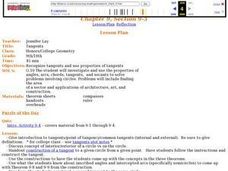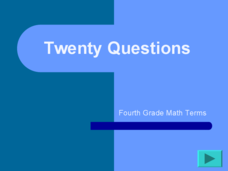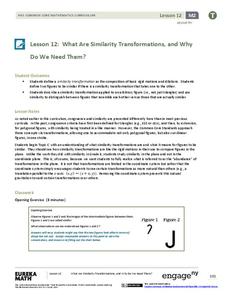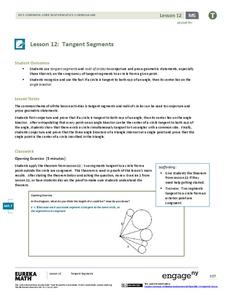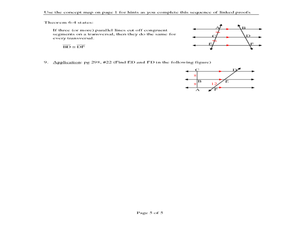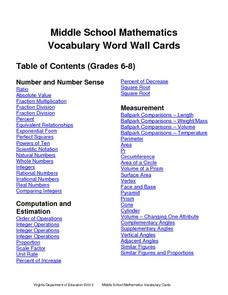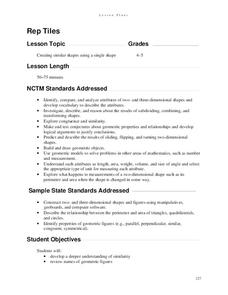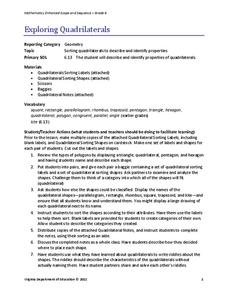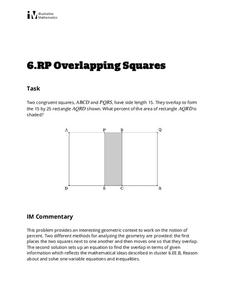Curated OER
Reflections
Students investigate image and pre-image. In this geometry lesson, students identify the reflection and rotation of different shape on a coordinate plane. They identify similarities and differences of image and pre-image of a reflection.
Curated OER
Translations
Students perform translations on different polygons. In this geometry instructional activity, students create figures that will be used as an assessment to represent transformation. They perform hands on creation and relate it to the...
Curated OER
Faces, Vertices, Edges
Students identify the parts of three dimensional objects. In this geometry lesson, students find the number of faces, edges and vertices. They differentiate between prisms and polyhedra.
Curated OER
Tricky Traps
Students create identify properties of trapezoids. In this geometry lesson, students calculate the area of given trapezoids and review the area formula for parallelograms. They draw a correlation between the area of a trapezoid and that...
Curated OER
Math: Tangents
Students discover how to recognize tangents and how to use their properties. They investigate and use the properties of angles, arcs, chords, tangents, and secants. Students use two tangents and the properties of similar triangles to...
Curated OER
Twenty Questions: Fourth Grade Math Terms
Questions related to math vocabulary from a large variety of categories for 4th graders are displayed throughout this Jeopardy game. Concepts covered include angles, shapes, computation terms, statistics, and place value.
Curated OER
Tantalizing Tangrams
Fourth graders participate in what is considered to be a model lesson. The lesson focuses upon polygons and basic geometry. The lesson addresses national standards and displays how others should be done.
Curated OER
Dilations of 2 and 3 dimentional figures and their effect on area, surface area, and volume.
Seventh graders investigate the area and volume of 2D and 3D figures. In this geometry lesson, 7th graders create a storyboard explaining their knowledge of 2D and 3D shapes. They analyze their data and interpret their results.
EngageNY
What Are Similarity Transformations, and Why Do We Need Them?
It's time for your young artists to shine! Learners examine images to determine possible similarity transformations. They then provide a sequence of transformations that map one image to the next, or give an explanation why it is not...
EngageNY
Tangent Segments
What's so special about tangents? Learners first explore how if a circle is tangent to both rays of an angle, then its center is on the angle bisector. They then complete a set of exercises designed to explore further properties and...
EngageNY
General Pyramids and Cones and Their Cross-Sections
Are pyramids and cones similar in definition to prisms and cylinders? By examining the definitions, pupils determine that pyramids and cones are subsets of general cones. Working in groups, they continue to investigate the relationships...
Curated OER
Logical Relationship of Postulates & Theorems
In this postulates and theorems instructional activity, students explore a concept map containing information about angles and sides, alternate interior angles, and diagonals of a parallelogram. They use the concept map to prove...
Curated OER
Geo Jammin' By DeSign - Day 2, Lesson 9: Bringing It To A Fine Gloss-ary
Pupils create a glossary of geometric terms while exploring tangram manipulatives.
Virginia Department of Education
Middle School Mathematics Vocabulary Word Wall Cards
Having a good working knowledge of math vocabulary is so important for learners as they progress through different levels of mathematical learning. Here is 125 pages worth of wonderfully constructed vocabulary and concept review cards....
Curated OER
Regents Exam Questions G.G.26: Inverse 2
In this inverse learning exercise, students solve 6 short answer problems. Students find the inverse of a given conditional statement.
Curated OER
Regents Exam Questions GG 26: Contrapositive 2
In this contrapositive instructional activity, students read logical statements. Afterwards, they write equivalent statements as well as the inverse and converse of statements. This three-page instructional activity contains 14...
Curated OER
Six Multiple Choice Logic Question for Given Conditional Statements
In this logic instructional activity, students answer six multiple choice questions by finding the inverse, converse, and contrapositive of a given conditional statement.
Curated OER
Can You Name That Shape?
Learners use materials to build, investigate, and draw two-dimensional shapes (polygons). They combine the shapes they have built and draw from the pile to begin a round-robin activity to name and determine the attributes of a selection...
Curated OER
Pythagorean Theorem by Graphic Manipulation
There are many different ways to show a proof of the Pythagorean Theorem. Here is a nice hands-on paper cutting activity that shows a graphic representation. You can even challenge your young Pythagoreans to come up with their own...
Improving Measurement and Geometry in Elementary Schools
Rep Tiles
In addition to the catchy title, this lesson plan provides upper graders an opportunity to more closely scrutinize the attributes of plane figures. In particular, they focus on the similarity of different shapes. Both whole-class and...
Virginia Department of Education
Exploring Quadrilaterals
Sort this resource into the Use pile. Scholars investigate attributes of quadrilaterals and then use the results to sort and classify the shapes labeling each figure with their properties to justify the classifications.
Illustrative Mathematics
Overlapping Squares
The objective of this activity is to find the percent of the area of a two squares overlapping. Mathematicians find the ratio of area for the part that overlaps to the rectangle formed. The final answer is a percent as a rate per 100....
Curated OER
Arts Impact and Math
Third graders incorporate math into dancing. In this algebra lesson, 3rd graders identify different shapes and patterns using dance movements. They relate the different creations to polygons as they incorporate the use of stretchy bands...
Arizona State University
Roundup Shapes
Let's study 2-D shapes! Young mathematicians compare and classify shapes according to attributes. They evaluate shape riddles and predict the shape being described. Here is the website where you can find the...






